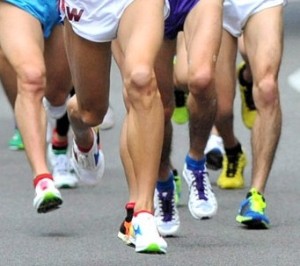
If you’re gearing up for the Des Moines Marathon, Des Moines Half Marathon, an Ironman, triathlon, road race, or relay, consider these six tips for using nutrition and specific exercises for before, during, and after your run to help ensure your peak performance and fast recovery.
1. Focus on warm-ups over stretching.
Stretching before a run was once believed to be the best way to improve performance and prevent injury. However, we now know that it can lead to stretch-induced strength loss.
“What is important,” says William O. Roberts, M.D. in “Should I Stretch Before My Runs?“, “Is to have the functional range of motion needed to perform an activity.” Therefore, functional warm-up routines, like high knees, backwards running, grapevines, side planks, and front planks, can increase and improve your performance, as well as decrease injury.
For more on the benefits of warming up over stretching, see this research article from the Journal of Strength and Conditioning Research: “Effects of Dynamic Stretching on Energy Cost in Running Endurance Performance in Trained Male Runners.”
2. Carb up pre-run.
“The best pre-run breakfast consists mainly of carbohydrates, since they are digested most rapidly and are your body’s preferred fuel source… (and) small amounts of protein will help stave off hunger during the later miles” (Penny Wilson, PhD in “Perfecting Your Pre-Race Food Strategy” by Monique Ryan).
Research shows that consuming 1.5-1.8 grams of carbohydrates per pound of body weight is ideal for improving performance (Ryan). She advises to begin consuming these carbs four hours before your race or training run.
3. Refuel along the way.
“Start taking in fuel within 30 minutes of hitting the pavement,” says Pamela Nisevich Bede in “How to Eat During Long Runs.” For longer runs, bring sustenance with you and try consuming small amounts every 15 minutes. As a rule of thumb, you’ll need to add 30-60 grams of carbohydrates for each hour that you run over 75 minutes (Nisevich Bede).
4. Recover with protein and carbohydrates.
Within 30 minutes of finishing, consume about 20 grams of protein and 40 grams of carbohydrates in the form of a workout shake or whole food, depending on your preference and dietary restrictions. Consuming fats immediately is not ideal because these slow down the digestion of the proteins and sugars, so keep it to just protein and carbs.
5. Use dynamic stretching.
There isn’t one right answer for what to do post-run as far as movement. But from a functional perspective, dynamic stretching after a workout can help prevent injuries. Dynamic, or triplanar stretching, moves your muscles in all directions. See the following example of tri-planar stretching from Lindsay Mumma, D.C.
6. Drink water to your thirst.
Evidence is diverse on how much water to drink and when before, during, and after your run. According to Dr. Maharam in “Revisionist Drinking,” “We’re used to hearing that thirst falls behind what you really need, but that doesn’t hold true scientifically” (Runner’s World Blog). Therefore, a good rule of thumb is to drink according to your thirst. And if you sweat more, you’ll want to consume more.
Share this Post
